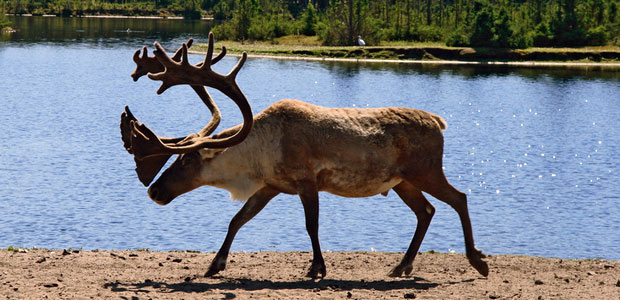Advertisement
New Federal Government Plan to Save Threatened Alberta Caribou: Fence Them In
In July we told you about Alberta woodland caribou threatened because of continued development by the oil sands industry and inaction by governments—both provincial and federal. Following intense pressure to act, the federal government, in consultation with industry and environmental advocates, has proposed, among other ideas, penning the caribou to protect them from predators. Room … Continued

In July we told you about Alberta woodland caribou threatened because of continued development by the oil sands industry and inaction by governments—both provincial and federal. Following intense pressure to act, the federal government, in consultation with industry and environmental advocates, has proposed, among other ideas, penning the caribou to protect them from predators.
Room to roam
In order to survive, these caribou require vast expanses of relatively undisturbed, older forest habitat in order to spread out so they are harder for predators and hunters to find. With oil sands development in the north of Alberta, much of the woodland caribou’s habitat is being lost to logging and fragmentation from seismic lines, pipelines, power lines, and roads.
Federal government told to act
In response to a federal court ruling following two lawsuits by environmental groups that challenged the federal government to abide by its own Species at Risk Act and put in place a recovery strategy for the threatened caribou, Ottawa has just released their Recovery Strategy for the Woodland Caribou.
Fence caribou in
In the document, one of the suggestions for mitigation in the area of Alberta where oil sands development has caused caribou habitat loss says, “indirect predator management (e.g. penning of boreal caribou)” should be given high priority to prevent the highly endangered herds from vanishing.
This suggestion was offered in a study released in July by the Oilsands Leadership Initiative (an industry consortium) that recommended fencing off at least 1,500 square kilometres to protect caribou from predators such as wolves. Wolves and deer would be kept out of the area to minimize predation and competition.
Shoot wolves
The federal recovery plan also includes “predator management,” which means shooting wolves. And news reports say, “Environment Minister Peter Kent has estimated that thousands of wolves could be shot to keep caribou alive in the oil sands region.”
Reaction is mixed
Reaction to Ottawa’s just-released recovery strategy for the woodland caribou has been mixed. Its commitment to habitat restoration has been lauded, but the responsibility for industry development to be stopped if a caribou range falls below the limit set by the strategy (65 percent intact) has been criticized.
“All that’s required for development to proceed is a ‘vague plan’ which could take decades to implement,” according to Stan Boutin, Professor and NSERC Industrial Research Chair in Integrated Landscape Management at the University of Alberta and a leading authority on woodland caribou.
Read all about other endangered species in our Wildlife Wednesday posts by logging into alive.com, entering “Wildlife Wednesday” in the Search field, and then clicking on POSTS.





